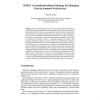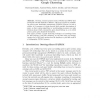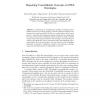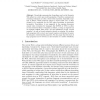100
click to vote
ESWS
2006
Springer
15 years 4 months ago
2006
Springer
In the extensive usage of ontologies envisaged by the Semantic Web there is a compelling need for expressing mappings between the components of heterogeneous ontologies. These mapp...
121
click to vote
ESWS
2006
Springer
15 years 4 months ago
2006
Springer
Abstract. Many approaches for RDF stores exist, most of them using very straight-forward techniques to store triples in or mapping RDF Schema classes to database tables. In this pa...
109
click to vote
ESWS
2006
Springer
15 years 4 months ago
2006
Springer
Functional descriptions are a central pillar of Semantic Web services. Disregarding details on how to invoke and consume the service, they shall provide a black box description for...
100
click to vote
ESWS
2006
Springer
15 years 4 months ago
2006
Springer
We present a comprehensive approach to ontology evaluation and validation, which have become a crucial problem for the development of semantic technologies. Existing evaluation met...
106
click to vote
ESWS
2006
Springer
15 years 4 months ago
2006
Springer
The aim of this paper is to provide a general ontology that allows the specification of trust requirements in the Semantic Web Services environment. Both client and Web Service can...
101
click to vote
ESWS
2006
Springer
15 years 4 months ago
2006
Springer
We present an architecture for combining wikis containing hypertext with ontologies containing formal, structured information. A web-based ontology editor that supports collaborati...
ESWS
2006
Springer
15 years 4 months ago
2006
Springer
Recently, research projects such as PADLR and SWAP have developed tools like Edutella or Bibster, which are targeted at establishing peer-to-peer knowledge management (P2PKM) syste...
ESWS
2006
Springer
15 years 4 months ago
2006
Springer
Abstract. In this paper, we investigate the problem of repairing unsatisfiable concepts in an OWL ontology in detail, keeping in mind the user perspective as much as possible. We f...
113
click to vote
ESWS
2006
Springer
15 years 4 months ago
2006
Springer
Abstract. We outline a framework for managing information quality (IQ) in eScience, using ontologies, semantic annotation of resources, and data bindings. Scientists define the qua...
132
click to vote
ESWS
2006
Springer
15 years 4 months ago
2006
Springer
Knowledge representation formalisms used on the Semantic Web adhere to a strict open world assumption. Therefore, nonmonotonic reasoning techniques are often viewed with scepticism...




